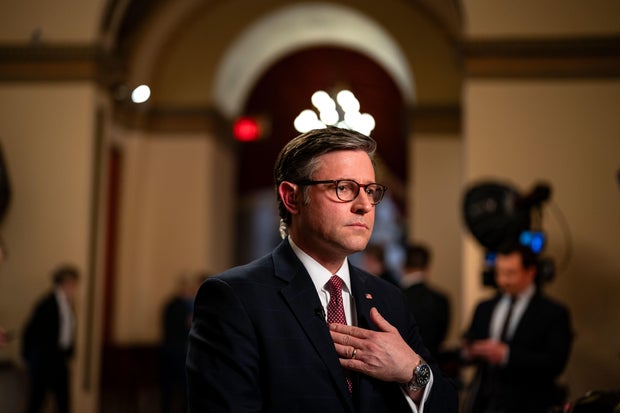Washington — Lawmakers will return to Capitol Hill on Monday after a lengthy August recess to kick off a government funding fight with just three weeks to avert a shutdown.
Congress has until Oct. 1 to fund the government amid the pre-Election Day sprint. And with the abbreviated timeline, lawmakers will almost certainly need to pass a stopgap measure to keep the government funded — leaving the full-year funding effort for a later date.
House Republicans began seriously discussing their opening salvo in the spending negotiations last week, with a plan to push for a continuing resolution to keep the government funded through March 28, while attaching a non-citizen voting bill that Democrats generally see as a nonstarter. Speaker Mike Johnson discussed the plan with House Republicans during a call last week, a source familiar with the call told CBS News, unveiling the bill text on Friday.
The move to couple the SAVE Act — a House-passed measure aimed at targeting illegal voting that would require proof of citizenship to register to vote in federal elections — came after the House Freedom Caucus made it their official position heading into the spending fight. Republicans have highlighted the issue in recent months despite only U.S. citizens being eligible to vote in federal elections.

Johnson said the move represented a “critically important step” to fund the government and “secure our federal election process,” adding in a statement that “Congress has a responsibility to do both, and we must ensure that only American citizens can decide American elections.” The House could vote on the measure as soon as Wednesday. But it’s passage is uncertain, even in the lower chamber.
Five Democrats voted with the slim Republican majority to approve the voting measure in July. But it’s not expected to go over well with the party more broadly. The White House “strongly opposes” the measure, arguing that it wouldn’t safeguard elections but will make it harder for Americans to register to vote. And Senate Majority Leader Chuck Schumer and Sen. Patty Murray of Washington, the top Democratic appropriator in the Senate, urged in a joint statement that “avoiding a government shutdown requires bipartisanship,” criticizing the GOP opening gambit.
“If Speaker Johnson drives House Republicans down this highly partisan path, the odds of a shutdown go way up, and Americans will know that the responsibility of a shutdown will be on the House Republicans’ hands,” Schumer and Murray said.
Murray’s counterpart in the House, Democratic Rep. Rosa DeLauro of Connecticut, lambasted House Republicans for taking the appropriations process “down a partisan path,” while refusing to “meet House Democrats at the table.”
“We need a continuing resolution because House Republicans let their most extreme members drive the ship,” DeLauro added in an emailed statement, urging that a stopgap measure to keep the government funded through December is better for Americans. “Let us hope the majority does not drive us straight to a Republican shutdown.”
A continuing resolution to keep the government funded has been widely anticipated, with a long road ahead to approve the 12 appropriations bills to keep the government funded on Oct. 1. But how long the temporary measure would last remains undetermined. Johnson told House Republicans that he does not want to pursue the typical pre-holiday omnibus package to which Congress often resorts to fund the government, the source told CBS News.
Punting the funding deadline to the new year could be more favorable for Republicans should they win control of the White House or the Senate. Part of the calculus for Republicans centers on the possibility of returning former President Donald Trump to the Oval Office, where he could bring more leverage in the funding fight should it be put on hold until the new year. Still, the move would tee up a spending clash early in the next administration that could prove difficult for either candidate.
The latest spending saga comes a year after the deadline led to former House Speaker Kevin McCarthy’s ouster, in an unprecedented move that ratcheted up the stakes of future funding fights.
Whether House Republicans stick together this time around remains to be seen. Among some Republicans, the pushback to Johnson’s plan has already been swift. Rep. Matt Rosendale, a Montana Republican, called the move a messaging bill that doesn’t increase the chances of passing a short-term measure to keep the government funded — or reduce the deficit.
“I wasn’t sent to Washington to deliver disingenuous and dishonest messaging bills,” Rosendale said.
Nikole Killion contributed to this report.
Kaia Hubbard is a politics reporter for CBS News Digital, based in Washington, D.C.


